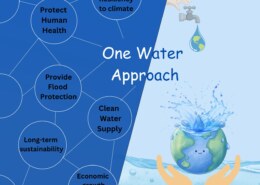In your opinion, what are the most promising innovations in renewable energy technology, and how might they address global energy challenges?
Microplastics, tiny plastic particles less than 5mm in size, pose significant threats to marine ecosystems and human health. In marine environments, microplastics are ingested by a wide range of organisms, from plankton to larger marine animals, disrupting food chains and potentially causing physicaRead more
Microplastics, tiny plastic particles less than 5mm in size, pose significant threats to marine ecosystems and human health. In marine environments, microplastics are ingested by a wide range of organisms, from plankton to larger marine animals, disrupting food chains and potentially causing physical harm, toxic exposure, and reproductive issues. These particles can also serve as vectors for harmful pollutants, which can accumulate in the tissues of marine organisms and magnify up the food chain. For humans, consuming seafood contaminated with microplastics and associated toxins can lead to adverse health effects, including inflammation, endocrine disruption, and potential carcinogenic risks. Additionally, the pervasive presence of microplastics in the environment can affect water quality and biodiversity, further threatening the stability and health of marine ecosystems.
See less


The global energy landscape is undergoing significant transformation due to innovations in renewable energy. These changes are driven by advancements in technologies such as solar photovoltaics, wind turbines, hydroelectric power, and energy storage systems. As a result, renewable energy sources areRead more
The global energy landscape is undergoing significant transformation due to innovations in renewable energy. These changes are driven by advancements in technologies such as solar photovoltaics, wind turbines, hydroelectric power, and energy storage systems. As a result, renewable energy sources are becoming more efficient, cost-effective, and scalable. This shift is reducing reliance on fossil fuels, decreasing greenhouse gas emissions, and mitigating climate change impacts. Countries are increasingly integrating renewable energy into their grids, leading to more stable and resilient energy systems. Moreover, the growth of renewable energy industries is creating new economic opportunities and jobs, fostering sustainable development. These innovations also promote energy independence, enhancing national security by reducing dependence on imported fuels. Overall, renewable energy innovation is steering the world towards a more sustainable, clean, and economically robust future.
See less